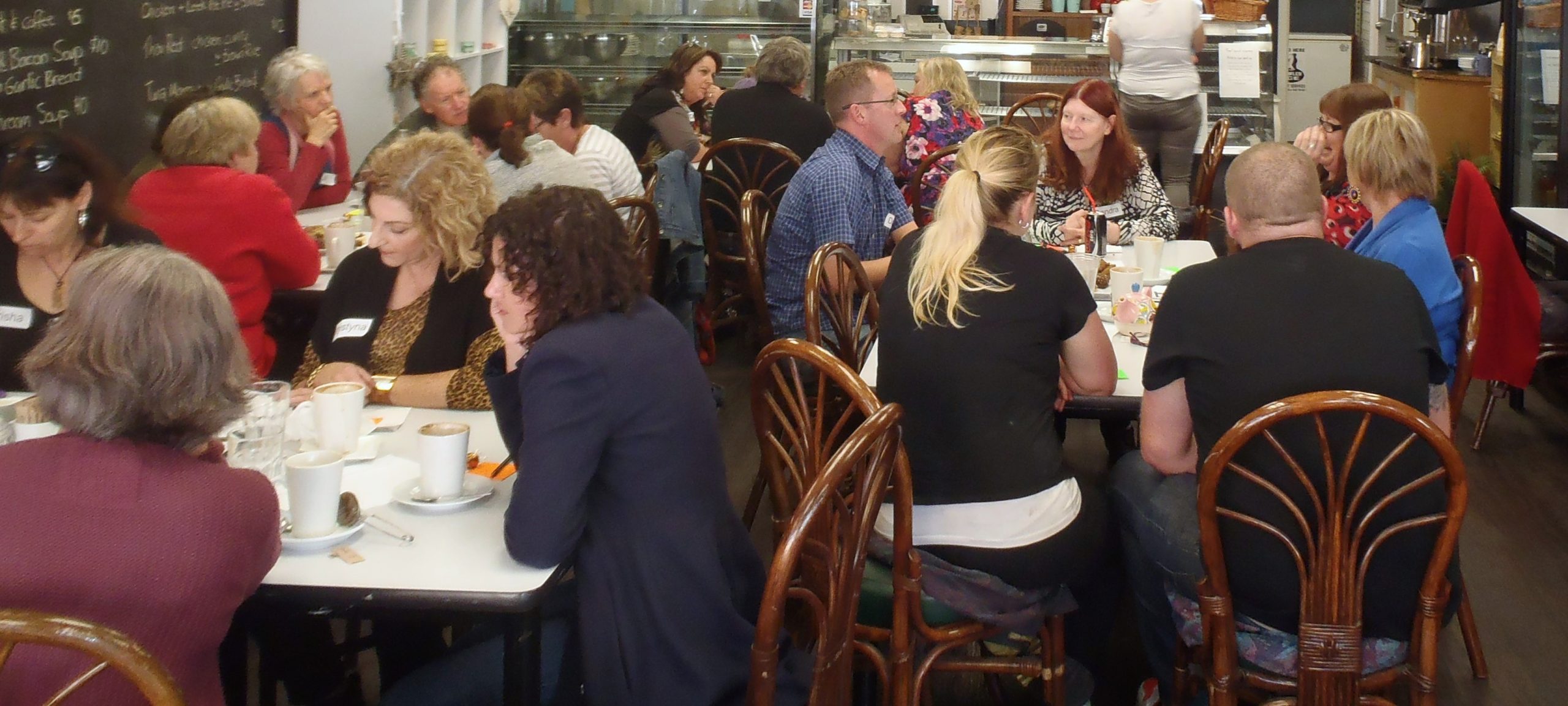MAY 4, 2015
There were lots of laughs at our 3rd Death Café. Twenty five of us came together to have a cuppa, cake and conversation about death. Contrary to what people may think, a Death Café is a space where you talk about death to become more engaged with life. Such is the paradox of a Death Café.
We came from all walks of life, aged 6 months to 64 years old, from all over South Australia but met as equals because we all have one thing in common. We know we are going to die. We don’t have many spaces in our lives or our culture that are conducive to talking about death and dying. But people are hungry to talk about their experiences, to listen to others and to reflect on death. The warm and inviting Alchemy Café in Gawler opened its doors for us once again. Mignon wowed everyone by serving up platters of home-made tempting tasty treats for each table along with a hot cup of whatever we desired. The local newspaper photographer popped in and took photos and names for this week’s social pages.
People ask me what my background is to run these events. They ask if I am from Palliative Care or Aged Care or the Funeral Industry. A natural response because currently in our culture, death is managed by the Medical and Funeral Industries. But I am from none of the above. I facilitate these events as part of my process in coming to terms with my son’s death. 3 years ago my son Robbie was killed in a car accident. The biggest realisation I have had is how incredibly badly we do death. If only I knew then what I know now I would have done things so very differently for Robbie’s after death care.
But it’s not all doom and gloom. I keep coming across these innovative and inspiring community-generated initiatives, like the Death Café, that are reconnecting us with death, dying and bereavement. As I come across these initiatives I bring them to Gawler so I can be a participant-facilitator.
So … what is Death Café? A Death Cafe is a group directed discussion of death with no agenda, no objectives or no themes. It is an emergent process where we create and hold a space for each of us to talk, listen and reflect on death. And in that space magic often happens. It’s a discussion group rather than a grief support or counselling session. There is no intention of leading any of us to any conclusion, to buy any product, to use any service or to take any course of action.
The first Death Café was in 2010 hosted by Bernard Crettaz, a Swiss sociologist who wanted to bring death out of secrecy. He called it Café Mortel. A year later in 2011 Jon Underwood in London, UK read about the Café Mortel in a newspaper and was inspired to host his own Death Café. Jon has become the global governor on volunteer basis to ensure the essence of Death Café stay true to their core values. To host your own Death Café download the guidelines at deathcafe.com. There has been about 2,000 Death Cafes around the world to date. With 10 people on average per Death Café that equates to a minimum of 20,000 participants.
Our 25 courageous participants on Saturday joined the growing global number of pioneers, who are blazing a trail for people to rethink, reclaim and reconnect with death, dying and bereavement.
We began with each person giving their 20 second elevator speech on what brought them to the Death Café. Some of those elevators must have been in very tall buildings judging by the time of some of those introductions. Reasons included curiosity, wanting to hear other’s views and experiences, wanting to run own Death Cafes, been before and loved it so back for more, wanting to talk about death without people judging you as morbid, wanting to share experiences, wanting to feel heard.
Then for an hour each table had its own group directed discussion. There are only 3 rules:
- Active listening to the person speaking
- Respect for all views, values and beliefs
- Confidentiality
We used post-it notes to write down thoughts as they popped into our heads so we didn’t interrupt the person speaking. We concluded with people sharing insights and thoughts with the whole group.
Some of the insights and topics shared were:
- People die as they have lived. This is a concept spoken about in the Palliative care industry. This one really resonated with me.
- Where there’s a will, there’s a family member.
- People die not accepting death. They want more and more medical intervention instead of accepting their death. They are afraid of death.
- We see death as a failure in our culture and constantly move away from it rather than embracing it as just another life transition.
- There is Death with a capital “D” and death with a lower case “d”. We have lots of little deaths in our life and then the final physical Death.
- Have you got your will updated?
- Have you thought about and written down your last wishes? This is now called an Advance Care Directive.
- Personal stories were shared around sudden deaths from accidents and suicides, from long term illnesses and from old age.
Judging by the feedback sheets everyone felt heard and nurtured. Some of the words describing the event were: Very warm, relaxed and friendly. Well organised. Well structured. Excellent. Thought provoking. Enlightening. Empowering. Great conversation. Sensitive. Amazingly comfortable. Worthwhile. Authentic. Real. Uplifting. Fun. Keep doing this please … death needs to be discussed!
And remember:
Talking about sex won’t make you pregnant, just like talking about death won’t make you dead.
Unknown
See you at the next event. Any questions? Let me know.
